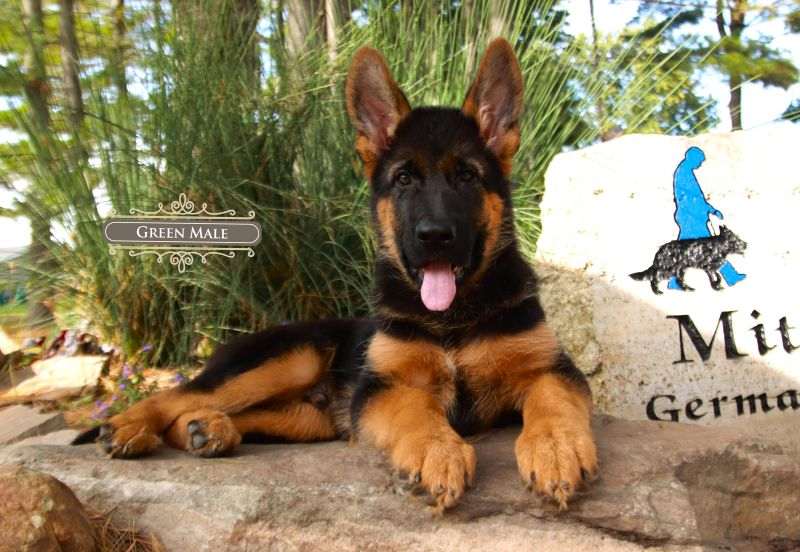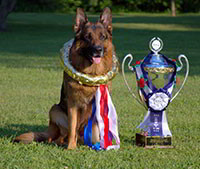TL;DR:
German Shepherds can make excellent family dogs when properly trained, socialized, and cared for. Their intelligence, loyalty, and adaptability help them bond with children, though gender may influence play style, maturity rate, and protectiveness. Early socialization, consistent training, and meeting their physical and mental needs are essential for safe, positive interactions.
Many parents looking for a family-friendly dog ask, Are German Shepherds good with kids? This is an important question because a dog’s temperament, energy level, and trainability can directly affect family harmony. German Shepherds are known for their intelligence, loyalty, and adaptability, which can make them an excellent choice for families.
However, like any breed, their suitability for homes with children depends on proper training, socialization, and responsible ownership. Gender can also influence behavior, with some differences in maturity, protectiveness, and play style between males and females. Knowing these qualities, along with safe interaction practices, helps families create a secure environment where children and dogs can thrive.

Temperament & Personality Traits Of German Shepherds
German Shepherds are a working breed originally developed for herding and guarding livestock. Over time, they have become popular as police, military, and service dogs because of their intelligence, loyalty, and trainability. When raised in a loving home environment, these traits can make them excellent companions for children.
Some key temperament traits that influence how they interact with kids include:
- Protectiveness – German Shepherds may form strong bonds with family members, including children, and act as protectors.
- Trainability – Their intelligence makes them responsive to obedience training, which helps them learn safe and appropriate behaviors around children.
- Energy Level – They require daily exercise to prevent boredom and destructive habits.
- Sensitivity – They respond well to calm, confident leadership and can become stressed if exposed to inconsistent rules or rough handling.
When a German Shepherd grows up in a structured and loving home, these qualities can make them dependable family dogs.
Male & Female German Shepherds Around Kids
Some families may wonder, Are male German Shepherds good with kids? Or are female GSDs better? The answer is that, while training, socialization, and individual personality have the greatest impact, certain traits are more commonly observed in males and females. Here are the common differences that can help parents choose the right fit for their household.
| Trait | Male German Shepherds | Female German Shepherds |
| Playfulness | Can be energetic and playful, which may appeal to active children who enjoy outdoor activities. | May be playful, but sometimes more measured in their activity levels. |
| Protective Instincts | Some may be more territorial, leading to strong protection of family members. | Can be equally protective but may show it in a calmer, more controlled way. |
| Size & Strength | Typically larger and stronger, requiring consistent training to avoid accidental knocks or rough play. | Generally smaller and lighter, which can make them easier for children to handle under supervision. |
| Maturity Rate | May mature at a slower rate, which can mean a longer puppy-like phase. | May mature more quickly, making them easier to train earlier. |
| Temperament Stability | Energy and behavior can be more intense, especially in early years. | Some families find them slightly calmer in the home. |
Families who ask, Are female German Shepherds good with kids?, may find that females can offer a calmer, more measured personality. On the contrary, males may bring higher energy and playfulness. In either case, consistent training, early socialization, and supervised interaction are key to building a safe and positive relationship.
How Socialization Shapes A German Shepherd’s Behavior
A German Shepherd’s success in a family home depends greatly on early and consistent socialization. This process helps them feel comfortable around children, other people, and different environments. Introducing the dog gradually to children through short, calm interactions allows trust to develop over time.
Exposing the dog to a variety of sights, sounds, and settings also builds confidence and reduces the risk of fear-based reactions. Just as important, children should learn how to interact with the dogs respectfully, approaching slowly, petting gently, and engaging in safe play. When both the dog and the children understand how to behave around one another, the chances of a positive relationship increase significantly.
Training & Care For German Shepherds In Family Homes
Proper training and care play a central role in ensuring a GSD fits comfortably into a home with children. By combining consistent training with attentive care, families can create an environment where the dog understands expectations and can interact safely and confidently.
Building Safe Interaction Through Training
Training helps a German Shepherd learn boundaries, follow commands, and adapt to the household routine. Starting with basic obedience, such as sit, stay, come, and leave it, sets the foundation for safe behavior in daily situations. Adding impulse control exercises, like waiting calmly before meals, walks, or playtime, also encourages patience and self‑control.
Playtime is another important training opportunity. Guiding the dog toward gentle, structured games and discouraging overly rough play keeps interactions safe for the dog and the children. Additionally, using positive reinforcement, like treats, toys, or verbal praise, strengthens good habits. With consistent, fair training, the dog and kids can learn how to interact respectfully.
Supporting Well‑Being To Promote Harmony
Training alone is not enough. Dogs need consistent care and an active lifestyle to stay balanced and responsive. Regular exercise, like daily walks, play sessions, and training drills, can help maintain their physical fitness and manage energy levels. Mental stimulation through puzzle toys, scent games, and new challenges also keeps them engaged and prevents boredom‑related behaviors.
A predictable routine for feeding, walks, and rest provides structure and security, while ongoing veterinary care, vaccinations, and grooming support long‑term health. When their physical, mental, and emotional needs are met, German Shepherds are more likely to remain calm, patient, and dependable companions for children.
Safety Tips For Families With German Shepherds & Kids
GSDs can form strong bonds with children, but even the most well‑trained and gentle dog benefits from supervised interactions. Close oversight reduces the risk of accidental harm to either the child or the dog, especially during play or high‑energy moments. To maintain safety, consider these practical guidelines:
- Supervise All Interactions – Never leave young children alone with the dog, regardless of the dog’s temperament.
- Set Clear Rules – Teach children not to disturb the dog while it is eating, sleeping, or resting.
- Respect Personal Space – Give the dog a quiet area to retreat to if it becomes overwhelmed.
- Encourage Calm Greetings – Have children approach and greet the dog in a relaxed manner without sudden movements.
- Limit Rough Play – Discourage pulling on fur, ears, or tail to avoid accidental injury or defensive reactions.
Consistently applying these safety measures helps protect the dog and the child. When children learn to respect a German Shepherd’s boundaries and the dog is guided toward positive interactions, the result is a more harmonious and secure family environment.
Teaching Kids & Dogs To Respect Each Other
Educating children about proper dog interaction is as important as training the dog itself. This mutual understanding fosters a respectful relationship and reduces the risk of misunderstandings. Key lessons to teach children include:
- Approach Slowly: Always let the dog see and sniff them before petting.
- Avoid Interrupting Rest: Do not disturb the dog while it is sleeping or eating.
- Be Gentle: Pet softly without pulling fur, ears, or tail.
- Play Appropriately: Use toys for play instead of hands or clothing.
- Recognize Signals: Learn to identify signs that the dog wants space, such as turning away or walking off.

GSDs are admired for their loyalty, intelligence, and protective nature, but are German Shepherds good with kids? They absolutely can be when matched with the right family and raised in a structured, respectful environment. At Mittelwest German Shepherds, we take extra care in pairing each dog with a household that fits its temperament and drive, especially when children are involved.
Building A Positive Bond Between German Shepherds & Kids
Raising a German Shepherd alongside your children can be one of the most rewarding experiences for a family. At Mittelwest German Shepherds, we focus on pairing families with dogs that have the right temperament, early socialization, and training foundation to succeed in a home with kids.
From the start, we prepare our puppies to be confident and well‑mannered through hands‑on care and structured interaction. If you’re searching for a German Shepherd that fits your family’s lifestyle, contact Mittelwest German Shepherds today. We’ll help you find a companion that grows with your children and becomes a trusted part of your home.

Julie Martinez is a German Shepherd breeder and the owner of Mittelwest German Shepherds in Wonder Lake, Illinois. She breeds German Shepherd Dogs under the “vom Mittelwest” kennel name and is listed as a breeder on the AKC Marketplace. Through her breeding program, Julie focuses on German-bred bloodlines and works with owners who value structure, temperament, and real-world working ability. She is also involved in local working-dog training through the Wonder Lake Schutzhund Club, where Mittelwest supports hands-on development such as tracking and club training.













